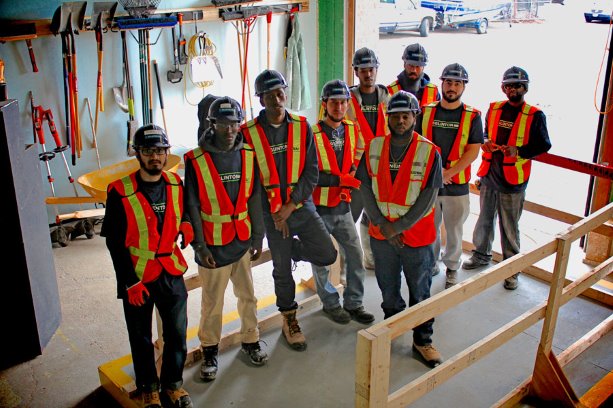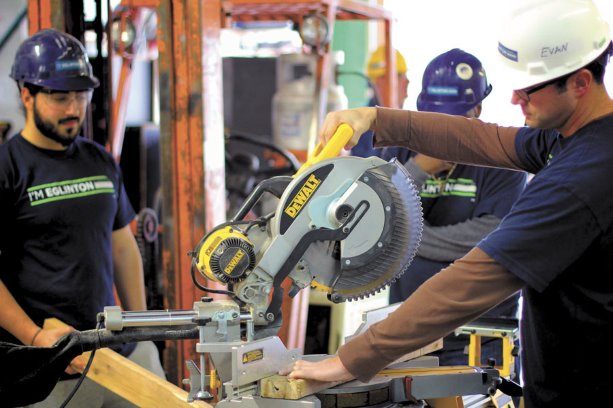Organizers of a Toronto building trades pre-apprenticeship program called Trade Linx see the program as having a dual purpose: helping to build a workforce for the new crop of infrastructure projects promised by governments and providing jobs for people in low-income neighbourhoods.
It is a win-win situation, says Steve Shallhorn, executive director of the non-profit Labour Education Centre (LEC), which operated the pre-apprenticeship program under the name I’m Eglinton for about a year-and-a-half until the name change to Trade Linx in late 2016.
"We saw what was coming down the road in terms of light rail transit bills and other infrastructure spending and we know that there are high numbers of unemployed youth," he says.
"Linking them is a no-brainer."
But developing a pre-apprenticeship program with a high retention rate is not easy, particularly when many of the participants are at-risk youth. Dropout numbers can be high.
The LEC has locked onto a formula for success, however. Last year 34 of 38 participants graduated from three 12-week cohorts (courses), says Shallhorn. All went on to jobs, mostly in apprenticeship placements with various building trades unions.
Positive results are partly because of a rigorous screening process that ensures applicants selected really want a career in the trades, says Shallhorn.
But Trade Linx goes further. A "wraparound support" system built into the program aims to keep students from faltering, he explains.
Team building sessions are an important aspect and organizers instil an attitude of collaboration. They also preach that participants should look out for each other.
"We’re not warm and fuzzy but we’re not a boot camp either like some programs promote themselves to be," he says.
He adds on its last cohort, which wrapped up in December, the LEC partnered with the Careers Education Empowerment Centre for Young Black Professionals which provided a social worker and case worker to assist students through difficult periods during the program.
The City of Toronto, which funds the LEC’s Trade Linx, provided additional monies for the support system.
"So far it is working," says Shallhorn. "We predict it will work in the workplace and that policy-makers will determine that it is worth the extra money to make sure these programs actually work."
The LEC’s executive director says while he is unaware of any other pre-apprenticeship program with a similar built-in support system, he sees it catching on because it is money well spent at steering disenfranchised people into skilled trades where worker shortages are on the upswing.
"We see ourselves as a feeder to the building trades training centres," he adds, saying the LEC’s strong relationship with building trades unions has much to do with Trade Linx’s success.
The LEC is affiliated with the Toronto and York District Labour Council.
While Trade Linx is not geared to a specific trade, graduates have gone onto apprenticeship jobs in carpentry, electrical, plumbing and ironwork.
To qualify for placement in the program, students must be Ontario Works (OW) recipients and have Grade 10 English and math or its equivalency.
There is no age restriction, says Shallhorn, noting that one of the standout students was a man in his 50s.
"He was a kind of a self-taught carpenter interested in becoming a union member and a journeyperson," Shallhorn describes.
And while that student became a star pupil and a mentor to fellow students, he was stabbed to death on the street after completing the program.
"It was a really sad story, and underlines some of the kinds of things going on in the communities we deal with," Shallhorn states. "We target people that may be at risk of gangs and street crime and we try providing them with an alternative."
He says one of the key reasons students drop out of programs like Trade Linx is because of financial problems.
"Anybody in any training program will tell you that for the program to be successful, people need to have an income relative to their needs," he says. "Nobody can tell me that you can live on OW rates of about $600 a month in Toronto."
Shallhorn says Trade Linx will have three cohorts this year.
Each 12-week session is five eight-hour days a week, starting at 7:30 a.m. DeWalt Power Tools provides students with a free toolkit and tools.
The curriculum includes essential skills (reading and communications), health and safety training courses and practical work experience on such sites as Habitat for Humanity.
"We place people in about six or seven different unions, which one depends on their interests, aptitude and what’s available," Shallhorn adds.












Recent Comments
comments for this post are closed